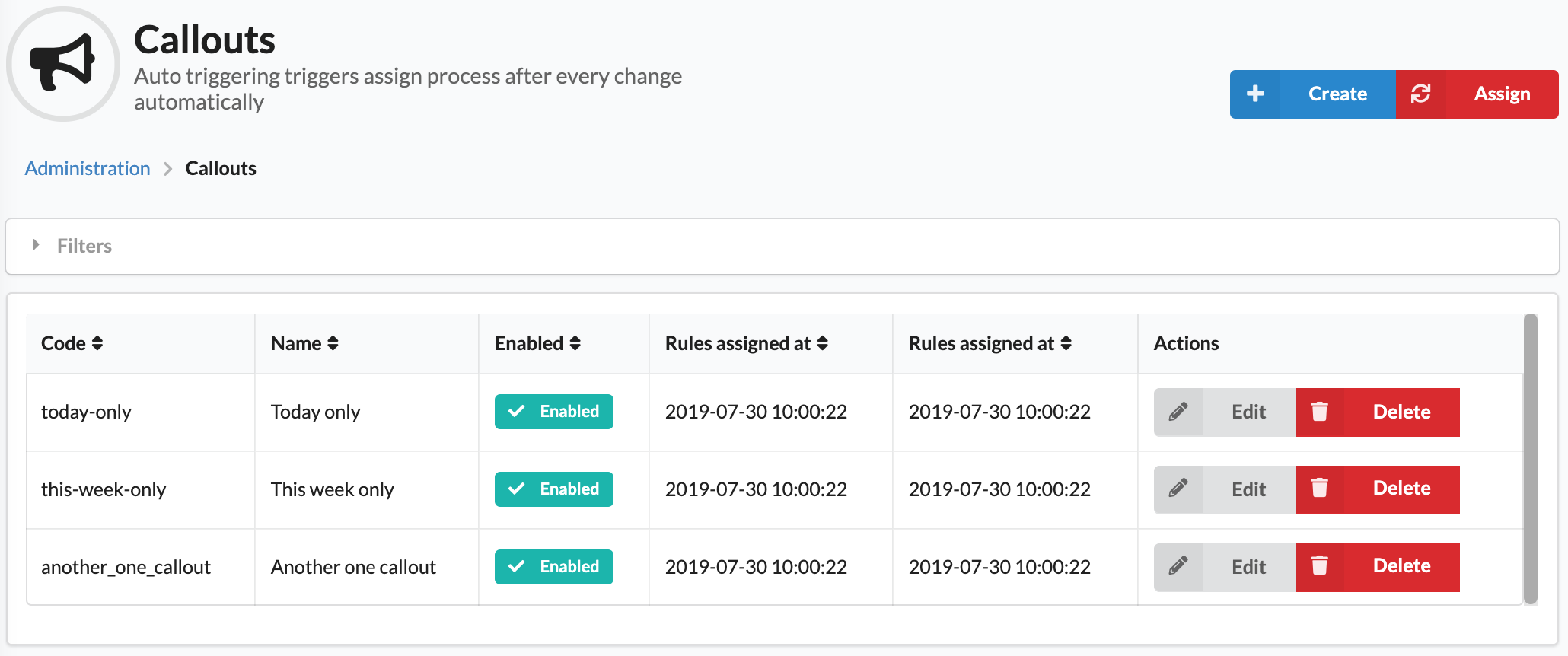The callout plugin for Sylius allows you to configure nice badges for different set of products based on specific rules. It provides a common set of configuration by default and is very flexible when it comes to adding new ones.
Supports Doctrine ORM driver only.
Shop:
Admin:
This plugin depends upon the Doctrine ORM Batcher bundle. Install that bundle first.
Open a command console, enter your project directory and execute the following command to download the latest stable version of this plugin:
$ composer require setono/sylius-callout-pluginThis command requires you to have Composer installed globally, as explained in the installation chapter of the Composer documentation.
Then, enable the plugin by adding it to the list of registered plugins/bundles
in config/bundles.php file of your project before (!) SyliusGridBundle:
<?php
$bundles = [
Setono\DoctrineORMBatcherBundle\SetonoDoctrineORMBatcherBundle::class => ['all' => true],
Setono\SyliusCalloutPlugin\SetonoSyliusCalloutPlugin::class => ['all' => true],
Sylius\Bundle\GridBundle\SyliusGridBundle::class => ['all' => true],
];Don't forget to add SetonoDoctrineORMBatcherBundle as this plugin require bundle to be enabled.
# config/packages/setono_product_callout.yaml
imports:
- { resource: "@SetonoSyliusCalloutPlugin/Resources/config/app/config.yaml" }
# If you want to see Callout column at admin products list - uncomment next line
# - { resource: "@SetonoSyliusCalloutPlugin/Resources/config/grids/sylius_admin_product.yaml" }
setono_sylius_callout:
manual_triggering: false
# Enable manual triggering if your store have too much products
# That way you can trigger callouts assign process manually when
# finish adding all rules
# manual_triggering: true
no_rules_eligible: false
# Set this option to true if you want no rules to be
# treated as eligible (e.g. callout without rules will
# be applied to all products)
# no_rules_eligible: true# config/routes/setono_product_callout.yaml
setono_product_callout:
resource: "@SetonoSyliusCalloutPlugin/Resources/config/routing.yaml"Read more about Sylius models customization here.
Add a Setono\SyliusCalloutPlugin\Model\CalloutsAwareTrait trait to your App\Entity\Product class.
-
If you use
annotationsmapping:<?php // src/Entity/Product.php namespace App\Entity; use Setono\SyliusCalloutPlugin\Model\CalloutsAwareTrait as SetonoSyliusCalloutCalloutsAwareTrait; use Setono\SyliusCalloutPlugin\Model\ProductInterface as SetonoSyliusCalloutProductInterface; use Sylius\Component\Core\Model\Product as BaseProduct; use Doctrine\ORM\Mapping as ORM; /** * @ORM\Entity * @ORM\Table(name="sylius_product") */ class Product extends BaseProduct implements SetonoSyliusCalloutProductInterface { use SetonoSyliusCalloutCalloutsAwareTrait { SetonoSyliusCalloutCalloutsAwareTrait::__construct as private __calloutsTraitConstruct; } public function __construct() { $this->__calloutsTraitConstruct(); parent::__construct(); } }
-
If you use
xmlmapping:<?php // src/Model/Product.php namespace App\Model; use Setono\SyliusCalloutPlugin\Model\CalloutsAwareTrait as SetonoSyliusCalloutCalloutsAwareTrait; use Setono\SyliusCalloutPlugin\Model\ProductInterface as SetonoSyliusCalloutProductInterface; use Sylius\Component\Core\Model\Product as BaseProduct; class Product extends BaseProduct implements SetonoSyliusCalloutProductInterface { use SetonoSyliusCalloutCalloutsAwareTrait { SetonoSyliusCalloutCalloutsAwareTrait::__construct as private __calloutsTraitConstruct; } public function __construct() { $this->__calloutsTraitConstruct(); parent::__construct(); } }
<?xml version="1.0" encoding="UTF-8"?> <doctrine-mapping xmlns="http://doctrine-project.org/schemas/orm/doctrine-mapping" xmlns:xsi="http://www.w3.org/2001/XMLSchema-instance" xsi:schemaLocation="http://doctrine-project.org/schemas/orm/doctrine-mapping http://doctrine-project.org/schemas/orm/doctrine-mapping.xsd"> <entity name="App\Model\Product" table="sylius_product"> <many-to-many field="callouts" target-entity="Setono\SyliusCalloutPlugin\Model\CalloutInterface"> <join-table name="setono_sylius_callout__product_callouts"> <join-columns> <join-column name="product_id" referenced-column-name="id" nullable="false" on-delete="CASCADE" /> </join-columns> <inverse-join-columns> <join-column name="callout_id" referenced-column-name="id" nullable="false" on-delete="CASCADE" /> </inverse-join-columns> </join-table> </many-to-many> </entity> </doctrine-mapping>
If you haven't done so already, configure the sylius_product resource to point to your App\Entity\Product like we
did in an example here.
$ php bin/console doctrine:migrations:diff
$ php bin/console doctrine:migrations:migrateAdd callouts to your product box template. By default, you should use templates/bundles/SyliusShopBundle/Product/_box.html.twig
path. Check out our _box.html.twig file for a reference.
Note the line: {% include "@SetonoSyliusCalloutPlugin/Shop/Product/Callout/_callouts.html.twig" with {'callouts' : product.callouts|setono_callouts} %}.
All commands in this plugin will extend the CommandInterface. Therefore you can route all commands easily by adding this to your Messenger config:
# config/packages/messenger.yaml
framework:
messenger:
routing:
# Route all command messages to the async transport
# This presumes that you have already set up an 'async' transport
'Setono\SyliusCalloutPlugin\Message\Command\CommandInterface': asyncFor the performance reasons, configure a cron job on your production server to execute $ bin/console setono:sylius-callout:assign command
once in a while in order to rebuild the index for callouts. In most cases it should be done by the resource event listener
triggered anytime you create/update a product or callout, but it is worth to have it covered if something goes wrong.
Example cron configuration (EDITOR=nano sudo crontab -e) to run command once a day:
0 2 * * * www-data /var/www/html/bin/console setono:sylius-callout:assign --env=prod
$ bin/console assets:installFrom now on you should be able to add new callouts in the admin panel. Once you add one, you just need to configure.
- Configure a new form under
App\Form\Type\Rulenamespace, - Add a rule checker under
App\Checker\Rulenamespace and make sure it implementsSetono\SyliusCalloutPlugin\Callout\Checker\Rule\ProductCalloutRuleCheckerInterfaceinterface and has apublic const TYPEset corresponding to the below service configuration - Register and tag new services:
<!-- services.xml -->
<services>
...
<service id="app.callout_rule_checker.is_on_sale" class="Setono\SyliusCalloutPlugin\Callout\Checker\Rule\IsOnSaleRuleChecker">
<argument type="service" id="setono_sylius_callout.checker.product_promotion" />
<tag name="setono_sylius_callout.callout_rule_checker" type="is_on_sale" label="setono_sylius_callout.ui.is_on_sale" form-type="Setono\SyliusCalloutPlugin\Form\Type\Rule\IsOnSaleConfigurationType" />
</service>
<service id="app.form.type.rule.is_on_sale" class="Setono\SyliusCalloutPlugin\Form\Type\Rule\IsOnSaleConfigurationType">
<tag name="form.type" />
</service>
</services>-
The service "setono_sylius_callout.command_bus.middleware.handle_message" has a dependency on a non-existent service "setono_doctrine_orm_batcher.factory.batcher".You forgot to add
SetonoDoctrineORMBatcherBundleto your app'sbundles.php

